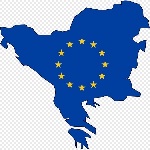The Balkans have always been, not the focus in particular of Europe – of governing Brussels, of industrial Germany, of lavish France, or of historic Britain – but undoubtedly one of its most vital, yet evidently neglected, organs.
The Great War, indeed, World War I, had its inception in the area, and the Balkans had their fair share of involvement in World War II as well; it does not take much of a tour through my native city in Macedonia of about 100,000 inhabitants, for example, for one to wonder why there is a need for so many distinct graveyards – German, French, Turkish, Jewish, in addition to the Macedonian – and what all those people could possibly have been doing in such a place as has seen nearly no recognition in the history books. Though this notoriety is not one to cite with any measure of pride, it certainly illustrates issues that have been taken up and frustratingly left to fester. This article explores the challenges that have faced the Balkans since perhaps antiquity (if one is interested enough to trace their roots so far back), and their manifestations transmuted into twenty-first century Europe.

- Croatia during the EU Youth Conference, Zagreb, 2013. | Image: Ivan Grozdanovski
As much as the Youth Conference in Zagreb of June, 2013, was about Croatia’s accession to the EU, it was also about European integrity and the continued efforts for expansion. Other questions developed, such as the challenges of youth unemployment, the potential prospects of the so-called lost generation, and the protests in Turkey.
But rising above all of these, hope was the prevailing sentiment – that Europe, despite a somewhat laborious recovery from the economic crisis, is heading towards a prosperous future and continuing with expansion nevertheless. From whatever angle they started, the conversations always seemed to return to the questions that have faced South-East Europe, namely the Western Balkans, these many years. The emerging young leaders of Europe and senior representatives alike agreed that the answers at long last must be in the making.
Since the conference, we have seen Serbia gain its accession negotiations; the decision from the European Union came after, and mostly consequentially to, Serbia agreeing to sign the proposed Brussels agreement with Kosovo on 19 April, 2013, to normalise relations after they had turned hostile following Kosovo’s secession in 2008. According to the Brussels agreement, neither country would interfere with the other’s efforts to join the European Union. Though the government of Serbia has stated that it will not recognise Kosovo as an independent country, the agreement nevertheless marked a milestone of no small weight for European integration efforts in the Western Balkans.
It cannot be said with any credible degree of certainty, however, that the Serbian public is entirely satisfied with the proceedings. According to a 2012 poll conducted by the Serbian European Integration Office, since 2009 the public support for the national prospects of accession to the EU had been steadily diminishing, and this on account of the mounting conditions imposed by the EU, namely to settle the issues with Kosovo. However, in a subsequent poll conducted in July of 2013, following the implementation of the Brussels agreement, these figures had actually risen by 9%, levelling off currently with a total of 50% of the population expected to support Serbia’s accession to the EU in a potential referendum. In retrospect, though insistence by the EU to normalise relations between the two nations seemed to be contributing to growing Euroscepticism in Serbia, the apprehensions in practice decreased when tangible progressions towards accession became apparent.
At the heart of the Balkans, a very similar problem of tensions in bilateral relations obstructs the progress of further European integration. After gaining its autonomy in 1991, The Republic of Macedonia, in order to differentiate itself from Greece’s northern province, agreed in 1993 to enter the UN under the proposed provisional name of “The Former Yugoslav Republic of Macedonia”. Twenty years have passed, however, 167 members of the UN have recognised the The Republic of Macedonia under its constitutional name, and the country, standing candidate for membership in the EU since 2005, despite having satisfied the required reforms, has still to join. The main opponents that have prevented its entrance have been, traditionally, Greece, on account of the name issue, and, more recently, Bulgaria. The latter has raised anew its objections to the claim of The Republic of Macedonia on certain historical figures, documents, events, and the like, that it insists belong to itself; and this misunderstanding might very well turn into the next grand issue occluding indefinitely the entrance of The Republic of Macedonia in the EU.

Though pundits have urged that due to the central location of The Republic of Macedonia in the Balkans, and other outstanding matters of security, economic stability, and social dynamics, the three countries settle the disputes, they have nonetheless dragged on.
The rising challenge, however, is that the issues between the three countries have now taken a double bilateral nature, obviating a holistic solution for rather a sequenced process. Recognising the necessity of promoting integration in the Western Balkans, international organisations such as the UN have intensified their efforts to promote an agreement between Greece and Macedonia.
More recently American diplomat Matthew Nimetz from the UN has become involved as a mediator, suggesting the name “The Upper Republic of Macedonia”; but this, too, was found unacceptable by both sides.
While Greece finds faults with the position of the qualifier “Upper” and demands that the name be legally binding for all purposes, The Republic of Macedonia would object to any changes to the name for bilateral purposes in relation to Greece and refuse to implement any compulsory amendments to the constitution and travel documents.
The deeper issue here, however, is the seemingly irreconcilable discrepancy in the underlying sentiments of the people of both nations. They have come to the point where neither side will accept a compromise. According to polls, even though one in three Macedonian citizens believes that Macedonia’s economy will stagnate if the name issue is not solved and the country remains excluded from the EU, still one in four is prepared at any time to protest in defense of “the name, language and identity”.
So adamantly do they stand, even to the detriment of more than a few foreign relations, because a loss in this matter would be tantamount to capitulation, and arguably worse, for the country as Macedonians know it would no longer exist, and neither would they. As the Greeks feel just as strongly, the situation has become nearly impossible to resolve without one side making tremendously detrimental concessions.
After a prolonged silence following his visits to the Prime Ministers of both nations, Mr. Nimetz recently revealed that the expectations of the two countries are still at distant ends of the spectrum.
Since then, the governing members of The Republic of Macedonia – the Prime Minister, Nikola Gruevski, especially – have intensified their efforts to establish what they deem a necessary step towards resolving the issue, a direct diplomatic discussion with Greece; but the latter has so far rejected the proposition, citing preoccupations with its own economic difficulties and referring The Republic of Macedonia back to the EU, which will not interfere directly anyway; and thus the issue continues to move in circles.
In the end, despite the particularly commendable scramble to settle the longstanding name issue this round, it looks like the next great milestone of Euro-integrations in the Western Balkans will not be made at this point.
But regardless of the ostensible failure of the mediations, one small strand of the discussions from the Youth Conference in Zagreb has in particular remained in my thoughts: it was the moment when Member of the European Parliament Sandra Jakovina said that if we could solve the problem between Belgrade and Pristina, we could also solve the problem between Greece and Macedonia, that somewhat tempered the scepticism of at least one European, be he official or not.
I also fondly recall a wave of heads nodding at the conference when someone brought up a particularly relatable old joke: the closer you get to Europe, the less enthusiastic you become. Maybe the scepticism in candidate countries is a good sign, then – a sign that they are getting closer.
Just maybe. Certainly, the challenges facing the Balkans are abstract, and esoteric, and archaic, and loaded; and describable by all the adjectives that would characterise the most bemusing conundrum. But Europe is old and profound, in the midst of a complete renewal.
After all the theories have been lain, shuffled, and brushed, the facts remain concrete beneath: Croatia has successfully acceded to the EU, Serbia has received its negotiations, Kosovo has started negotiations for its own Stabilization and Association Agreement (SAA), and The Republic of Macedonia has passed through yet another intense attempt at reconciliation with Greece to add to its growing CV.
One day it has to get that interview, no? In any case, the Western Balkans are indeed striving for higher, European standards; and again, this is certainly commendable.
Cover photo: Cradel (talk) (CC BY 3.0)








